When the day of Pentecost came, they were all together in one place. Suddenly a sound like the blowing of a violent wind came from heaven and filled the whole house where they were sitting. They saw what seemed to be tongues of fire that separated and came to rest on each of them. All of them were filled with the Holy Spirit and began to speak in other tongues as the Spirit enabled them.
Now there were staying in Jerusalem God-fearing Jews from every nation under heaven. When they heard this sound, a crowd came together in bewilderment, because each one heard their own language being spoken. Utterly amazed, they asked: “Aren’t all these who are speaking Galileans? Then how is it that each of us hears them in our native language? Parthians, Medes and Elamites; residents of Mesopotamia, Judea and Cappadocia, Pontus and Asia, Phrygia and Pamphylia, Egypt and the parts of Libya near Cyrene; visitors from Rome (both Jews and converts to Judaism); Cretans and Arabs—we hear them declaring the wonders of God in our own tongues!” Amazed and perplexed, they asked one another, “What does this mean?”
Some, however, made fun of them and said, “They have had too much wine.”
—Acts 2:1-13, NIV
Pentecost, the birth of the church, a momentous moment in Christian history. Diverse backgrounds assembled and a transcendent unity was made immanent by the powerful presence of the Holy Spirit. Unity came through diversity, and that diversity testified to the validity of their unity.
American society currently views distinction and division as synonymous. Those who are not like “us” get placed in the ambiguous category of “them”. Diversity is a threat rather than a path to unity. They only become us when we realize that there is a lot of them in the experiences thought only to belong to us.
Such transitional moments are the pentecostal (using this term in a different way) experiences that we so desperately need in our world today. They are the kairos moments whereby another kingdom enters our vocabulary, posture, and lives. We realize that our calling is not determined by the power dynamics of this world. Faith is as much how as it is what.
Pentecost is the reversal of Babel (Gen. 11:1-8). At Babel, uniformity of language produced an unfaithfulness of will that created a disunity with God. Pentecost is a diversity of languages, a faithfulness of will, that produces a unity-in-diversity moment for the church and world.
Babel reveals how worldly power works—moving inward, centralized, and coalescing at the top. Pentecost reveals the power of the kingdom—moving outward, dispersed, and measured by its faithfulness to those at the margins. Babel is human production and progress alone. Pentecost is a divine power encounter that reminds the world that our efforts alone will never satisfy the deep longings placed in us by a loving God, longings for community, friendship, peace, and good will.
Amid turmoil in Washington over debt ceilings, divisive identity politics aplenty, and fractures around diversity, may Pentecost remind us that our unity comes from the Spirit. Pentecost is as much a part of our redemption story as the cross and resurrection. Without Pentecost, transformation is impossible.
Babel will continue to beg of us to look to centralized power for our hope. If your faith journey is determined more by who occupies 1600 Pennsylvania Avenue than the risen Christ, then you are worshipping an idol. Before you declare that your allegiance is with Jesus alone, ask how you will feel in 2024 (or how you felt in 2020) if your candidate doesn’t win the presidency. That’s probably the best litmus test for your true allegiance.
I’m disappointed in America in this season. We are spoilt, ungrateful, and fear-mongering. We invent things to be afraid of because we don’t want to amid our bourgeoisie boredom. We are all locked away in our rooms, anxious about what’s next. But take heart, for in these moments the Spirit is near. Do we have eyes and ears to see?
I long for a unity-in-diversity moment in which the world believes that our unity is prompted by drunkenness. Alas, in this moment the church is too caught up in the politics of Babel to model any sort of peculiar difference to the world. We’ll never be accused of drunkenness, because we’re as ordinary as grape juice.
Come Holy Spirit, come in your power! Your church needs to be saved, but we are convinced we can save ourselves.
I’m going to take a break from blogging for a few months. Several writing and podcast projects will occupy my time. I will return in August with fresh reflections. Until then, be blessed!





Thank you for nudging us to realign ourselves with the right “Source!”
Wow!! Powerful perspective!!! Spot on!